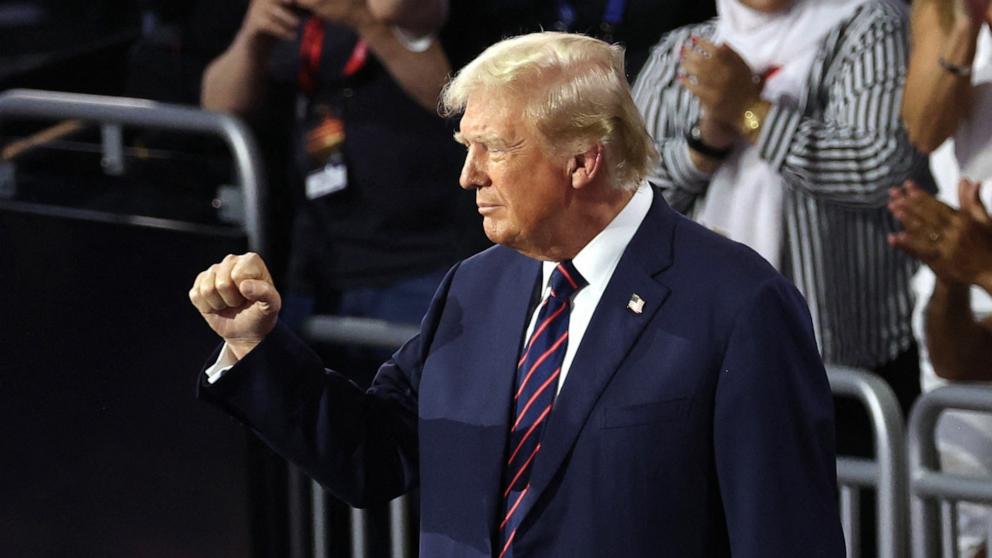At Donald Trump's raucous campaign rallies, many of his supporters boast that they have supported him “from the beginning.”
They are referring to the moment in June 2015 when Trump famously descended the escalator at Trump Tower, where he first announced he would run for president.
Since then, Trump has experienced many ups and downs on his way to Milwaukee, from his surprise victory over Hillary Clinton in November 2016, to his first impeachment in 2019, to his infamous arrest photo taken in Georgia's Fulton County Jail after he was indicted on charges of trying to overturn the results of the 2020 election.
His extraordinary political career culminated on Saturday night at a campaign rally in Butler, Pennsylvania, where he was shown on camera pumping his fist after surviving an assassination attempt and bleeding from a wounded ear.
Just two days later, the businessman-turned-politician rallied his party together to stage a slick and orderly 2024 Republican National Convention.
However, Trump's decade in politics has not been an easy one.
Indeed, when he first ran for president in 2015, “The Apprentice” star and real estate mogul was seen as an outsider and underdog, competing against Republican establishment heavyweights such as former Florida Gov. Jeb Bush and Texas Sen. Ted Cruz, both of whom already had the backing of key GOP figures and well-funded super PACs.
Although Trump quickly garnered the Republican vote after officially becoming the candidate in the summer of 2016, his victory over his Democratic rival in November 2016 came as a surprise to those who had been following election projections that predicted a Hillary Clinton victory.
Trump's term also got off to a rocky start: Within months of taking office, special counsel Robert Mueller launched an investigation into possible involvement of Trump and his campaign in Russian interference in the 2016 US presidential election.
After two years of investigation, Special Counsel Mueller and his team did not reach a conclusion on whether Trump committed obstruction of justice, but during the investigation they indicted 34 individuals and three Russian companies on a wide range of charges ranging from computer hacking to conspiracy to financial crimes, and led to seven guilty pleas and five prison sentences for several of Trump's closest associates.
And before Mueller's investigation was closed, a call between President Trump and then-newly elected Ukrainian President Volodymyr Zelensky — in which President Trump allegedly pressured the Ukrainian leader, working with his personal lawyer Rudy Giuliani, to investigate 2020 presidential rival Joe Biden — opened the door to a new Congressional investigation that ultimately led to Trump becoming only the third president in U.S. history to be impeached.
The Democratic-controlled House of Representatives voted 230-197 to remove him from office, but the Republican-controlled Senate acquitted him.
Two years later, just days before leaving the White House after four years in office, Trump became the first U.S. president to be impeached a second time for his alleged role in the January 6, 2021, attack on the U.S. Capitol.
It was the culmination of months of attempts by President Trump and his allies to overturn the results of the 2020 election, from making false and unfounded claims about election fraud and filing dozens of lawsuits challenging the election results, to allegedly pressuring other Republican officials at the federal and state levels, including then-Vice President Mike Pence and Georgia Secretary of State Brian Raffensperger, to overturn the election results.
For Trump, Jan. 6 sparked a mass exodus of major Republican donors and his alleged attempts to overturn the results of the 2020 election have led to two criminal indictments in the midst of the 2024 campaign: one federal lawsuit filed by Special Counsel Jack Smith in Washington, D.C., and one by District Attorney Fani Willis of Fulton County, Georgia.
The 2024 presidential election is already off to a tough start, with Trump becoming the first US president to be indicted in a New York hush-money case just months after announcing his candidacy for re-election.
And just six months before Election Day, he was convicted of all 34 counts of falsifying business records in the case, becoming the first U.S. president to be convicted of a crime.
While some Republicans and swing voters see Trump's legal battles and turmoil as a burden, for most Trump supporters they are a source of loyalty, with the Trump campaign and the Republican National Committee even claiming to have raised $53 million just 24 hours after Trump's conviction in the hush money case.
While battling four criminal charges and other legal challenges, a seemingly invincible Trump handily defeated a host of Republican primary challengers, including Florida Gov. Ron DeSantis and former South Carolina Gov. Nikki Haley, to become the party's presumptive nominee shortly after Super Tuesday.
As he prepared to deliver his formal acceptance speech as the Republican presidential nominee after months of divisive rallies and calls for retaliation, Trump said the assassination attempt had changed him and that he would seek to unite the country through a message of unity amid deepening turmoil within the Biden campaign and the Democratic Party.

